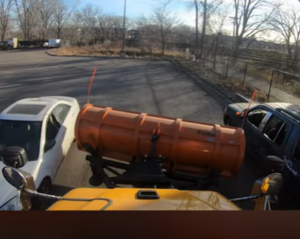Turning Junk Cars Into City Snowplow Training
By Troy Walsh, LMCIT loss control consultant

Snowplow operators are a skilled group of people who work to keep our streets clean and clear during the winter months. But how do drivers build those skills and keep them sharp? It’s definitely not a good idea to toss a new employee the keys to a snowplow and tell them to “figure it out.” Public works supervisors and other city leaders need to guide their drivers’ knowledge and help them build skills and muscle memory.
Snowplow operator training can range from a simple driving course in a parking lot to utilizing a defensive driving course around the state. Operators should undergo training annually to continue to sharpen their skills. Training is especially important with new operators, inexperienced operators, and if you have new or updated equipment.
St. Louis Park uses innovative props to help train operators
I recently saw a snowplow operators’ course from the City of St. Louis Park Public Works that utilized “junk” cars as props. Watch this video of the snowplow operators’ training. What a great perspective to use junk cars to show operators the location of the plows to parked vehicles, the distance of the wing plow in the vertical position as it relates to a parked vehicle, and provide an overall understanding of the snowplow operators’ expectations when they encounter obstacles on their routes.
When looking for vehicles to use as props, work with your fire department as they might use junk vehicles for extrication training. You may also want to consider scheduling snowplow operator training and extrication training around the same time in order to use the same vehicles for both.
Great job to the operators at the City of St. Louis Park for adding some real-life obstacles to snowplow drivers’ training and finding ways to minimize risks!

